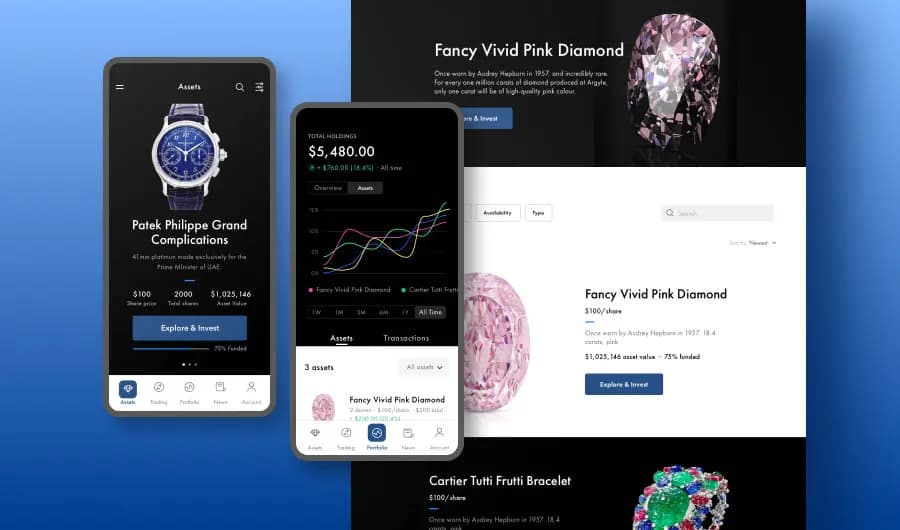
Marketing
Facilitating a Remote Hackathon

 Marina Revutska - Head of Design
Marina Revutska - Head of Design
 William Saffel - Content Marketing Specialist
William Saffel - Content Marketing Specialist
 Lawrence Valenti - Partner & CCO
Lawrence Valenti - Partner & CCO
Introduction
Hackathons have been a common practice among progressive companies as a way of driving innovation — according to recent statistics, over 80% of Fortune 100 companies conduct them, mostly on a recurring basis.
For those unfamiliar with the term, a “hackathon” is a method (an event, usually) to crowdsource solutions that address real-life business problems. These events usually involve a high level of sustained innovation from the participants.
Hackathons offer significant advantages over traditional company processes due to their crowdsourcing nature, which enables the creation of value and encourages a high level of openness to new ideas and creativity. Participants are motivated to brainstorm and suggest novel ways of addressing issues that are relevant to the organization. Typically, hackathons condense the primary stages of the innovation process, including problem identification, idea generation, and proof-of-concept development.
Consequently, a hackathon results in a comprehensive analysis of a particular business problem or set of problems and, at a minimum, a prototype solution that can be further developed using standard company processes.
Goals and Context
At Scalio, we had chosen to conduct a hackathon to explore challenges, opportunities and creative solutions to enhance our Growth Marketing process and materials.
We anticipated an opportunity to form new creative synergy between two departments - Creative and Marketing - and inspire a range of solutions, including the drafting of updated project case studies, exploration and optimization proposals for marketing workflows, and improved teamwork for future projects.
A few formal strategies that we had defined for the hackathon included:
- To provide 1 day for innovative project work, while encouraging the use of shortcuts and problem-solving
- Define and list approximately 10 of the highest value challenges within the Growth Marketing department, achievable within a 1-day turnaround
- Remove all internal & client Creative & Marketing project requirements, allowing all cross-functional participants to focus their collaborative efforts without common day-to-day project work
Best Practices for Remote Facilitation
Scalio prides itself as a globally remote company, with full-employed staff representing over 15 different countries around the globe. Consequently, the primary obstacle faced by this hackathon, unlike its conventional in-office counterpart, was the need to conduct it remotely.
The team enthusiastically met this remote challenge by coordinating the efforts of two departments with staff located across seven different time zones - from locations as San Francisco, Los Angeles, Europe, Africa, South America, and Indonesia.
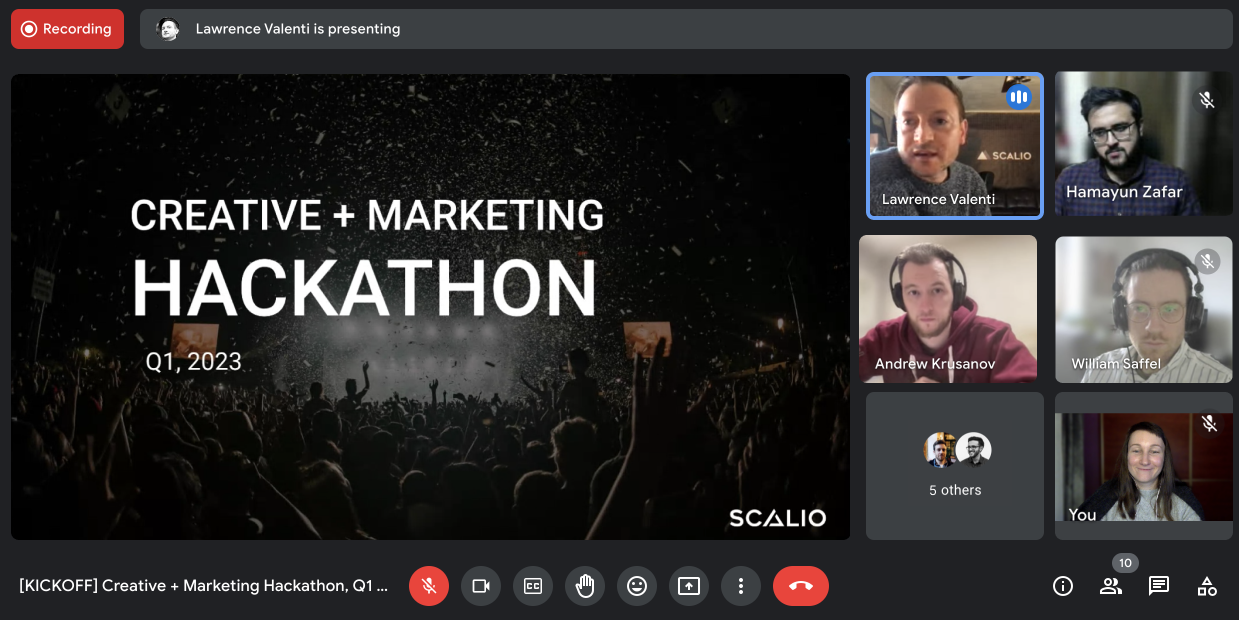
As a result, here are some best practices for facilitating this type of innovative, remote collaboration event in a very effective and convenient way:
Preparation
Operational preparation in advance played a strong supporting role in setting up the participants for a productive and collaborative hackathon day. These preparations included:
- Well-defined and documented requirements for any imagery or content formatting
- Guidelines and templates that saved time for the participants to on-board
- Data management and shared asset repositories to allow attendees to easily source and leverage the best content from prior projects
- Event documentation (in Notion) to organize the operational goals of the hackathon (condensed sample below)
- ProTip: For those interested in leveraging documentation, templates and hackathon guidelines, Scalio has several optimized Notion templates available. Reach out at hello@scal.io for an informal follow-up.
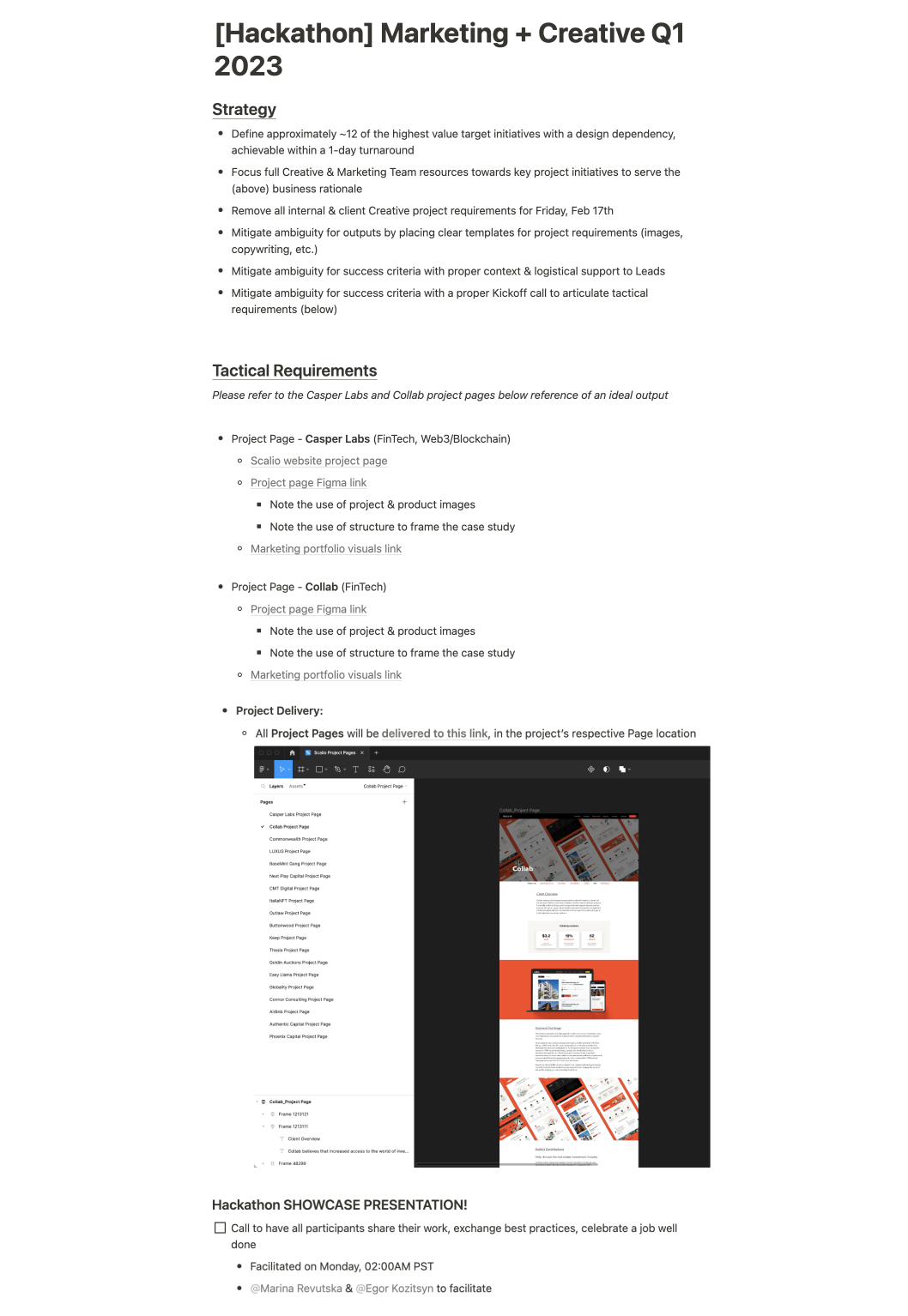
Mission & Alignment
Explicit kick-off and results overview meetings with all participants to provide full context in an effective and engaging way.
- The contextual value of these meetings was to provide the participating teams with a clear understanding of the business rationale, challenges, opportunities, and organizational goals of the hackathon, so all colleagues can clearly understand how their work will create value and support the broader company ecosystem.
Communication, Knowledge Sharing & Collaboration
- Asynchronous communication (via Slack) and ad-hoc team syncs to quickly clarify any questions or share best practices/experience(s) between teammates.
- Facilitating a concluding event celebration allowed all participants to present their work contextually and with ownership. Presenting awards for the top projects - as voted on by all of the participants - allowed for team recognition of a job well done.
Results
- The hackathon yielded excellent results, with over 13 unique and well-designed project case studies that were inches away from being deployed by the Marketing Team across various channels.
- New workstreams, templates, and creative standards were proposed, designed, and refined all within one day of collaboration.
- ProTip: For those interested in leveraging documentation, templates and hackathon guidelines, Scalio has several optimized Notion templates available. Reach out at hello@scal.io for an informal follow-up.
- Creative Designers & Marketing Specialists were allowed to align on evergreen content needs, formatting standardization, and content delivery.

Knowledge Sharing & Collaboration Experience
The true benefit for the teams involved was that the hackathon created a great opportunity for knowledge-sharing and experience:
- Within the Creative Department, creatives were able to spend quality, focused time “telling the story” behind their projects and how they created value for their clients.
- The Marketing Department earned a better understanding of the creative processes and approaches and was able to identify opportunities to standardize processes, define (and apply) best practices, and establish consistent guidelines across multiple projects.
- The Creative Department learned a better contextual understanding of marketing goals, as well as how their creative work directly impacts the organization’s global marketing strategy.
- Scalio Operation Managers also gained valuable insights from organizing this event that will improve future cross-functional hackathons.
Company Values
During the hackathon, we also reaffirmed our companies values as they appeared organically:
- Remote work: Scalio is a global, remote work environment, and we have pretty solid processes, practices, and overall culture that allow us to make any communication and collaboration within this environment highly effective and suitable for all the participants.
- Growing with the best: This hackathon involved people with different backgrounds, levels, and levels of expertise, creating stronger bonds between team members and inspiring future collaboration.
- Strength of diversity and creative work: By creating a space for creativity and knowledge sharing, we were able to produce a variety of interesting and inspiring outcomes.
- Open source: Scalio embraces an open-source value where all creatives have access to assets, design system components, and documented best practices across our 11-year history of project work.
Recognition of The Participating Staff
Acknowledging the participants' contribution as the driving force of the hackathon is important, not just the practical results. Here are the measures we took to emphasize this aspect:
- Results Presentation: The hackathon culminated in a presentation where participants showcased their work. It was inspiring to see them discuss their learnings and outcomes and - in some cases - reveal deeper and more valuable insights beyond the practical results.
- Confidential Survey: To honor our commitment to improvement, we conducted a confidential survey that sourced feedback on the hackathon, as well as confidential voting on the participants’ favorite projects.
- Tangible Recognition: We also showed our appreciation by awarding several participants with tangible prizes, such as "Most Creative/Well-Designed Project" or "Most Insightful/Inspiring Outcome."
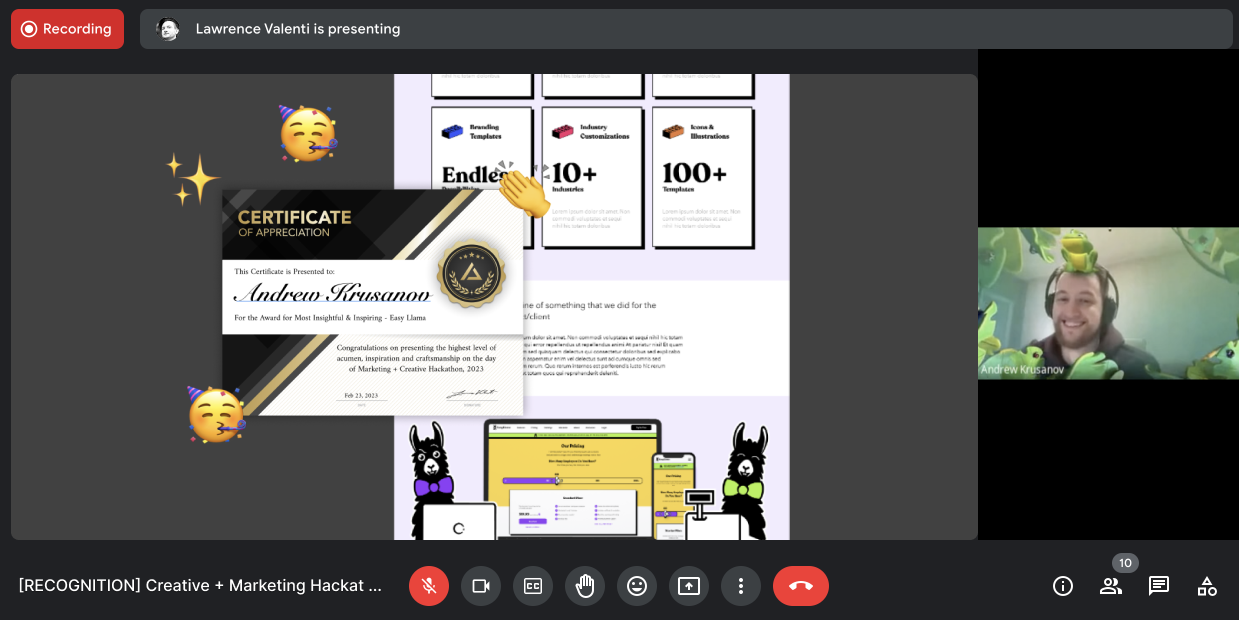
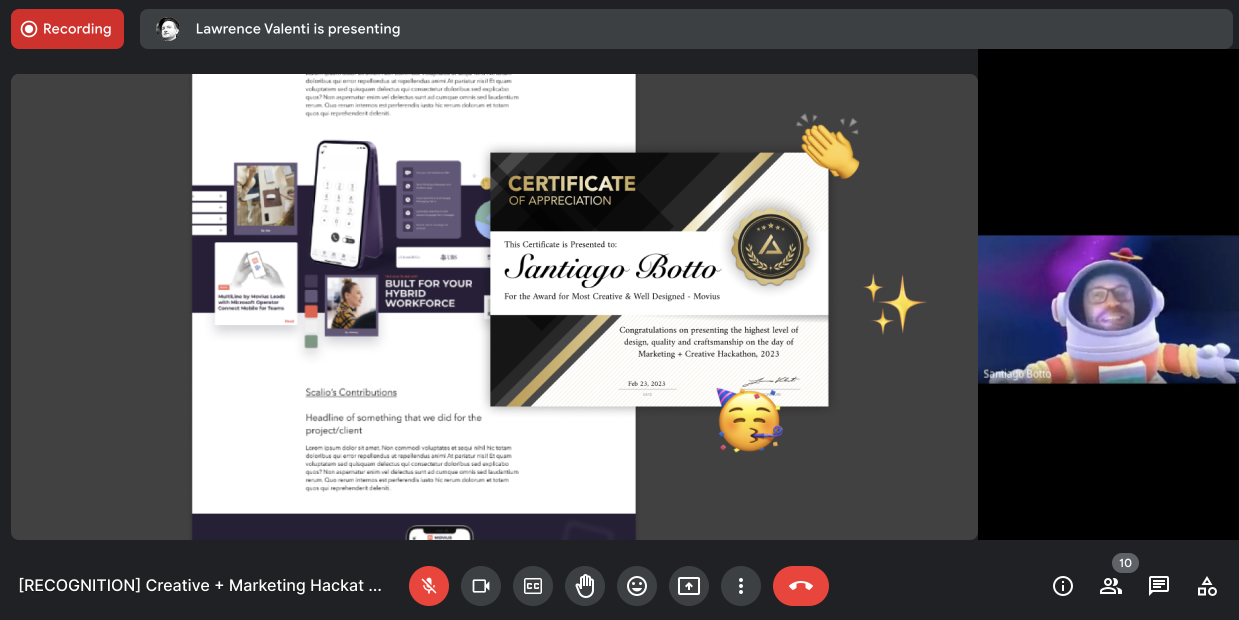
Conclusion
Scalio's hackathon provided an effective platform for fostering innovation and closer collaboration between the Creative and Marketing Departments while yielding tangible results that created value in a fraction of the time normally required.
By acknowledging and recognizing the participants' contribution, Scalio was able to lean into our strengths represented by a creative, collaborative, and diverse staff.
Despite the challenge of conducting the event remotely, the team managed to achieve their goals by utilizing best practices such as clear communication, balanced requirements, open knowledge-sharing within a business context, and shared asset repositories.
The event also reaffirmed the company's values, including remote work, diversity, and open-source sharing - and will be the first of many organizational hackathons.


